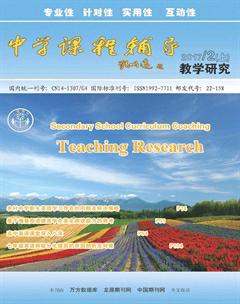How Can We Develop Students’ Critical Thinking Ability in the Process of Writing?
杨萍
Abstract:This essay mainly states that as teachers,we should develop students critical thinking ability in the process of writing. The author hopes that it will promote our English teaching more effectively.
Keywords:English teaching;Critical Thinking Ability; methods
中圖分类号:G632.0 文献标识码:A 文章编号:1992-7711(2017)02-0111
I. The definition of critical thinking and my understanding about it
The definition of critical thinking varies from one to another. Robert Ennis, an expert in critical thinking, thinks that critical thinking is reasonable, reflective thinking that is focused on deciding what to believe or do. In my opinion, thinking is natural. Critical thinking, however, is thinking that analyzes thought, that assesses thought, and that transforms thought for the better.
II. The significance of critical thinking in English writing
As a famous saying goes, “Give a man fish, he will have a meal; teach him to fish, hell have food all his life.” To equip students with critical thinking ability is of great importance to the intellectual development of students. It is also very essential to cultivate students creative spirit and innovational competence.
Writing is an effective way to develop critical thinking ability. When writing, students draw from what they have already known, seek relevant information about a main idea, and develop new concepts regarding that idea. That is when critical thinking is performed at its best. Knowledge and learning are not possible without critical thinking and writing is the best way to develop a mind that thinks critically.
III. Approaches to cultivate critical thinking ability in English writing
Several strategies can be adopted to develop critical thinking ability. They are previewing, annotating, summarizing, analyzing, questioning, predicting, and evaluating, and these strategies can benefit our teaching, especially in our writing class. Its vital for teachers to help students think critically with these strategies before, during and after writing. Next, lets take “Writing” of Unit 2, Book 1-“Why should I learn English?” for example to state how to develop students critical thinking by using some of the strategies mentioned above.
1. Pre-writing (Questioning & Analyzing strategies)
In this stage, students should not accept anything they are told blindly without questioning it. In order to help students have clear directions about what to write, the teacher should state the writing expectations clearly that students are required to write a three-paragraph article titled “Why should we learn English?”.
If students want to make their writings convincing, they should analyze the question—“Why should I learn English?”. So I take these steps: first, brainstorm on this topic in groups. As we know, a good way to practice critical thinking is group discussion in which students hear different points of view and the reasoning behind them. Also, getting others perspectives can help brainstorm creative ideas. Then, based on the ideas organized above, try to make a poster (also an outline) (including the topic sentences) according to the given sample in Ex. 2 on page 16. Making a poster is very useful for students to collect ideas and sentences before writing. At last, organize their ideas as well as their language including the connecting words. These connecting words will be of great help to state their ideas clearly. Organization of thought is one of the easiest but the most important critical thinking skills to recognize.
2. During the writing (Summarizing strategy)
After making a clear structure, students will be allowed to write the article. During the process of writing, students are required to provide supporting sentences to back up their topic sentences, that is, they should think of at least an example to support each point. With the main body of the article finished, students are expected to make a summary of the topic. While writing, students tend to acquire a better understanding of the topic. Not only do they think more deeply about the topic, but they learn about it. This is critical thinking in its simplest form.
3. Post-writing (Evaluating strategy)
Having finished a rough draft, students have to revise their work several times to achieve the “maximum possible accuracy and clarity”. During the revision, it is essential for teachers to give comments and feedback on the students writings. And it is an arduous way for students to go through the whole steps in writing, therefore, the teachers role is very crucial. Of course, for students, they should learn to evaluate the quality of their ideas as well as the ideas of others. After that, the teacher presents a good sample writing to help them reflect their own writings so that they can polish their writings better. Learning to appreciate and evaluate others writings is an effective and essential way to develop students critical thinking ability.
IV. Conclusions
As you can see, writing is a response, a reaction to feeling and thought about a particular subject. It is a natural process and as such goes hand-in-hand with critical thinking. I believe writing is a great way to enhance students critical thinking ability. In return, critical thinking also helps improve students writing skills. In conclusion, critical thinking is a kind of cognitive ability. And at the same time, critical thinking is also an attitude to life and we should help students develop critical thinking ability to be independent language learners.

